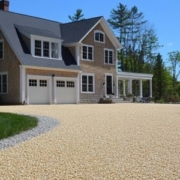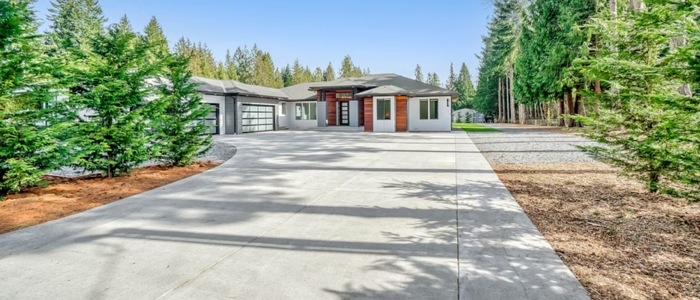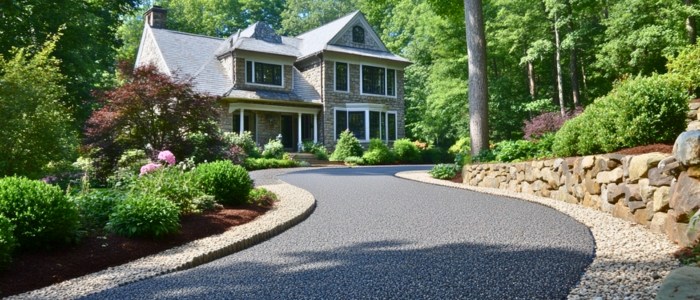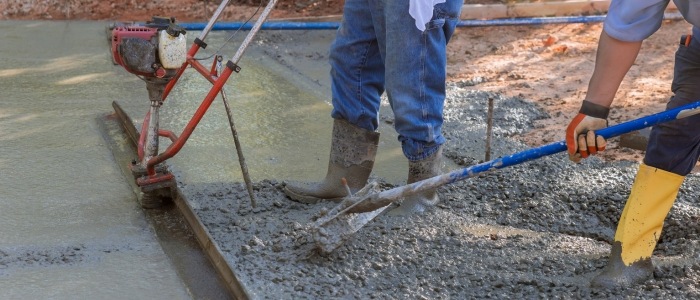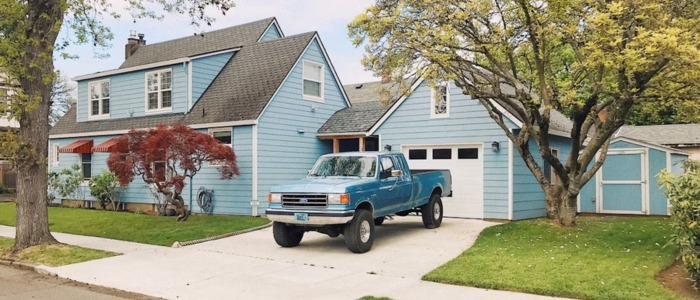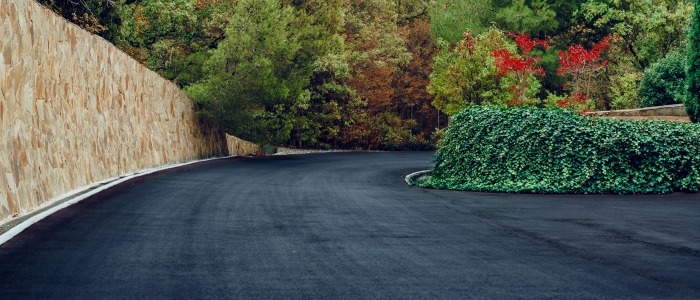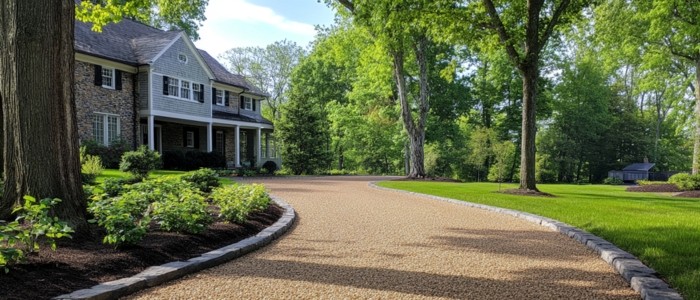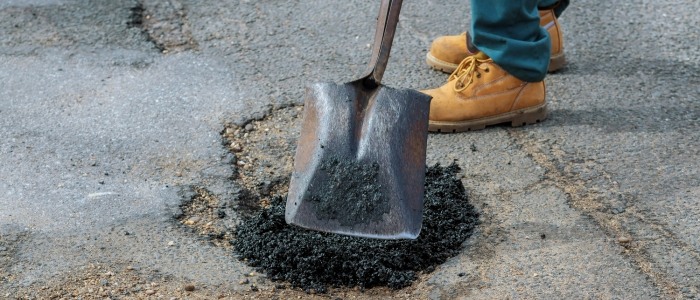Chip Seal Driveways – 5 Key Benefits for Durability & Style
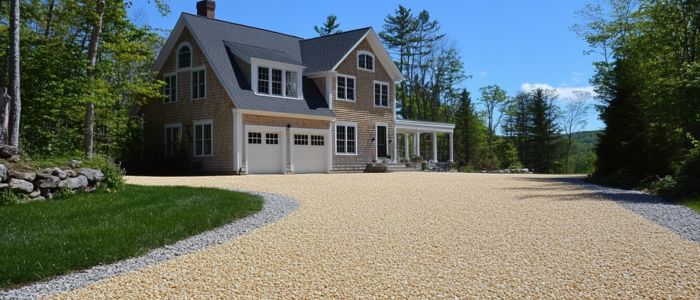
Imagine pulling into a driveway that not only enhances your property’s appearance but also stands up to New England’s toughest weather conditions.
A chip seal driveway delivers the perfect blend of durability, texture, and style, making it a long-term investment that offers value, performance, and aesthetic appeal. Popular in both residential and municipal applications, chip seal, also known as oil and stone paving, is ideal for homeowners looking for a rustic finish, strong weather resistance, and a low-maintenance surface.
From improved traction and fast installation to a lower environmental impact, chip seal has become one of the top alternatives to asphalt and concrete in the Northeast.
Here are the top five advantages of chip seal driveways:
- Tailored Designs: Elevating Aesthetic Appeal with Customization
- A Durable Choice for Any Climate
- Enhanced Traction for Safer, Slip-Resistant Surfaces
- Hassle-Free Installation: Fast and Seamless Driveway Solutions
- Eco-Friendly Materials for a Greener Driveway
Explore the five key advantages of chip seal driveways, and find out how this simple upgrade can dramatically improve your property’s look and function.
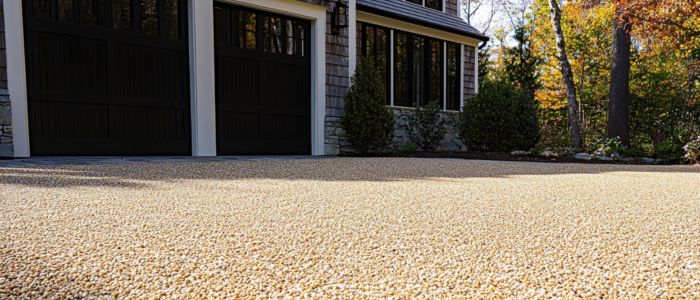
1. Tailored Designs: Elevating Aesthetic Appeal with Customization
Chip seal driveways offer plenty of design versatility.
By choosing from different aggregate sizes, colors, and finishes, you can customize your driveway to complement the style of your home. Whether your house is modern, rustic, or traditional, a chip seal driveway can be tailored to match its design.
Design Flexibility: The variety of stone colors available allows homeowners to create a unique look that blends seamlessly with landscaping and home exteriors, making your driveway an attractive extension of your property.
Looking for more natural surface options? Explore macadam driveways to see how they compare in durability and appearance.
2. A Durable Choice for Any Climate
One of the standout qualities of chip seal driveways is their durability across seasonal extremes. These surfaces are highly resistant to wear and tear caused by daily vehicle use and weather conditions such as rain, snow, and heat.
- Weather Resistance: Chip seal driveways perform well in cold-weather regions like New England, where freeze-thaw cycles often cause cracking in traditional asphalt. The flexible surface helps minimize structural damage, while the stone layer provides added durability against UV exposure, road salt, and moisture infiltration.
- Lifespan: Compared to other driveway options, a chip seal driveway typically lasts 10–15 years with minimal maintenance. With proper base prep and periodic resurfacing, many installations last 20 years or more (source).
- Cost: Chip seal is also a cost-effective solution. Installation typically ranges from $5 to $10 per square foot, making it significantly more affordable than concrete or decorative asphalt (Forbes). Maintenance costs are also lower, especially when resurfacing is done every 7–10 years instead of full replacement.
Ready to upgrade your driveway to a durable, weather-resistant surface?
Contact us today for a free quote and expert guidance.
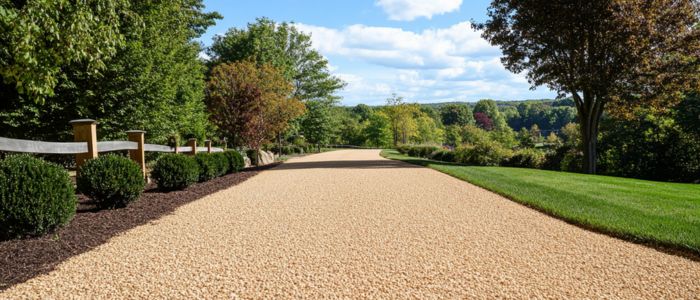
3. Enhanced Traction for Safer, Slip-Resistant Surfaces
The textured surface of a chip seal driveway offers superior traction, enhancing vehicle grip and ensuring safer driving conditions, particularly important during New England’s snowy or rainy months.
- Safety Considerations: The uneven surface provides better friction than traditional asphalt or concrete, which can become slick in wet conditions. This makes chip seal an excellent choice for homes in regions with frequent precipitation, ice, or snow.
Looking for another rustic yet durable option? Consider an oil and stone driveway for a solution that blends natural charm with resilience.
4. Hassle-Free Installation: Fast and Seamless Driveway Solutions
One of the major advantages of chip seal driveways is how quickly they can be installed. In many cases, the process can be completed in just a day or two, depending on the size of the area and weather conditions.
Minimal Disruption: Unlike concrete driveways, which can take several days to cure, a chip seal driveway allows for a faster installation process with less downtime, an ideal solution for Connecticut homeowners seeking minimal interruption to their routine.
Want a fast, seamless driveway upgrade with minimal disruption?
Check our services today to learn more about our hassle-free chip seal installations.
Get a free consultation and see how quickly we can transform your driveway!
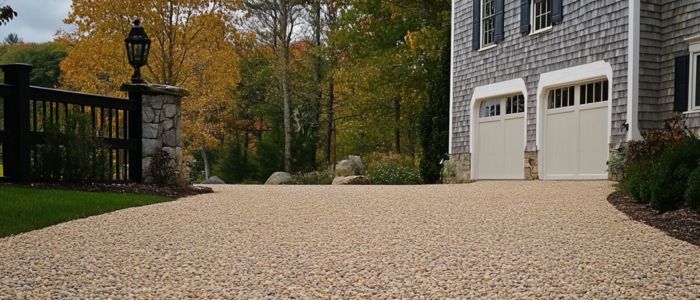
5. Eco-Friendly Materials for a Greener Driveway
Chip seal driveways are an environmentally friendly choice for several reasons.
The materials used in the process are often recycled, and the production of liquid asphalt and aggregate consumes less energy than that of traditional asphalt or concrete.
- Sustainable Materials: Recycled materials can be used in both the liquid asphalt and aggregate, making chip seal a greener option for eco-conscious homeowners.
- Energy Efficiency: The overall energy use in producing chip seal materials is lower than more intensive paving methods. In fact, the global demand for sustainable construction materials continues to grow, further supporting chip seal as a future-forward solution (source).
Want to reduce your driveway’s environmental impact? Get a free quote and learn how chip seal contributes to greener building practices.
Thinking About a New Chip Seal Driveway?
Request a Free Quote
Our team is ready to help you create a durable, beautiful surface that stands the test of time. Contact us today to learn more.
The Chip Seal Process
Understanding the chip seal process helps illustrate why this method is both efficient and long-lasting. Here’s how it works:
1. Surface Preparation
Before applying chip seal, the existing surface must be cleaned and repaired. Any cracks, potholes, or irregularities are addressed to create a solid foundation. In cold climates like New England, proper grading and drainage preparation are especially critical to avoid water retention and winter freeze damage.
2. Application of Liquid Asphalt
Once the surface is ready, a polymer-modified liquid asphalt binder is heated and sprayed evenly. This hot binder acts as a strong adhesive base for the aggregate.
Best Practice Tip: Binder temperature and spray rate must be precisely controlled to ensure maximum adhesion and longevity. Professional-grade equipment ensures consistency across the surface.
3. Spreading of Aggregate Chips
Immediately after the asphalt emulsion is applied, small crushed stone aggregate is distributed across the surface. Stone type, gradation, and color are selected based on both function and design.
Aggregate chips provide texture, boost durability, and offer the slip-resistant surface chip seal is known for.
4. Compaction
A heavy roller compacts the aggregate into the asphalt binder, embedding the stone for durability. Proper compaction is essential for long-term surface integrity, ensuring that chips don’t loosen under traffic.
Modern chip seal methods may also include a fog seal finish, which helps lock in aggregate and improve surface appearance.
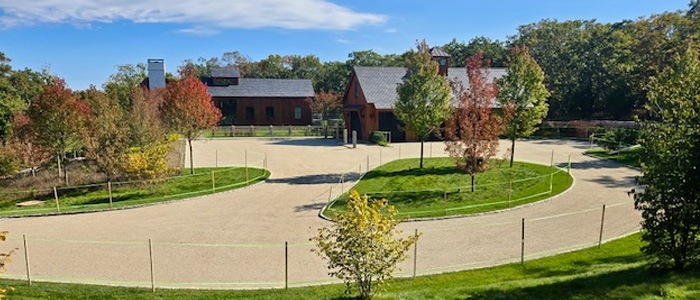
Featured Project: Martha’s Vineyard
In 2024, you could find us enhancing the main residence of a 100-acre Arabian horse farm on Martha’s Vineyard. We focused on precision, beauty, and functionality to meet the unique needs of this extraordinary property.
Let’s make your vision a reality.
Contact us now to explore how we can deliver exceptional asphalt solutions for your space.
Comparison to Other Types of Driveways
How does a chip seal driveway stack up against other common types of driveways like asphalt, concrete, and gravel? Here’s a comparison:
- Asphalt Driveways: While asphalt is smooth and durable, it tends to require more maintenance over time, especially with cracking and pothole repairs. Chip seal driveways, by contrast, offer better traction and weather resistance.
- Concrete Driveways: Concrete can be more expensive and time-consuming to install. While it’s highly durable, it lacks the flexibility in design that chip seal driveways offer with their choice of aggregate colors and textures.
- Gravel Driveways: Gravel driveways are often less expensive to install, but they require frequent maintenance to prevent the gravel from spreading. Chip seal driveways provide a more permanent and visually appealing solution while still maintaining some of the rustic charm of gravel.
| Surface Type | Lifespan | Cost per Sq Ft | Maintenance | Aesthetics | Weather Resistance |
| Chip Seal | 10–15 years (20+ with resurfacing) | $5–$10 | Low to moderate (resurface every 7–10 yrs) | Rustic, customizable stone finish | Excellent for freeze-thaw cycles |
| Asphalt | 15–25 years | $7–$15 | Moderate (seal every 3–5 yrs) | Smooth, traditional finish | Prone to cracking in cold weather |
| Concrete | 30–40 years | $12–$18 | Low, but costly to repair | Clean, formal appearance | Cracks in freeze-thaw conditions |
| Gravel | Indefinite (high upkeep) | $1–$3 | High (frequent regrading) | Rustic, informal look | Can wash out or rut in storms |
Cost & Value Over Time
When evaluating driveway materials, the true value lies in long-term cost efficiency, not just upfront installation. Chip seal offers a compelling financial case for homeowners and municipalities alike.
Installation Costs:
Chip seal typically costs $5 to $10 per square foot, depending on driveway size, base prep needs, and aggregate selection. This is 30–50% less than concrete and often 15–25% less than asphalt, making it a smart choice for budget-conscious projects.
Maintenance Costs:
Unlike asphalt, which needs crack sealing and resurfacing every few years, chip seal requires less frequent maintenance. Most chip seal surfaces can be resurfaced every 7–10 years at a fraction of the cost of a full replacement.
Lifecycle Value:
Over a 20-year period, chip seal often outperforms asphalt in both cost and durability, especially in freeze-thaw climates. Properly maintained chip seal driveways can be renewed rather than rebuilt, keeping costs lower over time.
If you’re looking for a driveway solution that balances affordability, longevity, and visual appeal, chip seal delivers measurable value year after year.
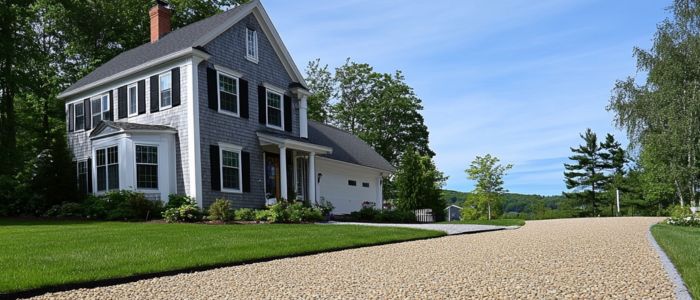
When Chip Seal Makes Sense – Ideal Applications & Use Cases
While chip seal is a highly adaptable surface treatment, it performs best under certain conditions. Understanding where it excels can help determine if it’s the right fit for your property.
Best Use Cases for Chip Seal:
- Rural and suburban driveways
- Private roads, farms, and estates
- Sloped or winding drives where traction is critical
- Driveways with existing gravel or worn asphalt surfaces
- Large driveways where paving cost is a concern
When Chip Seal May Not Be Ideal:
- Heavily trafficked commercial parking lots
- Driveways requiring a highly polished or decorative surface
- Areas with extremely steep gradients without proper drainage
If you’re unsure, schedule a consultation and we’ll help assess whether chip seal is the most cost-effective and functional solution for your driveway or access road.
Maintenance & Resurfacing – Extending the Life of Your Driveway
One of the biggest advantages of chip seal is how easily it can be maintained or refreshed without full removal and replacement.
Basic Maintenance Tips:
- Inspect seasonally for loose aggregate or surface wear.
- Sweep off debris to prevent surface damage or clogged drainage.
- Avoid turning wheels in place, especially in summer heat, to prevent surface displacement.
- Snow Removal: Use plow blades with rubber edges to avoid dislodging chips in winter.
When to Resurface:
- If your driveway shows signs of fading, loose stone, or mild cracking, but the base remains solid, it may be time for resurfacing instead of replacement.
- Most driveways benefit from a new chip seal coat every 7–10 years to restore traction, color, and protection.
Resurfacing is far more affordable than repaving and can extend the surface life by another 10+ years, saving thousands in long-term repair or replacement costs.
Learn more about the resurfacing process here:
Chip Seal Driveway Resurfacing Guide
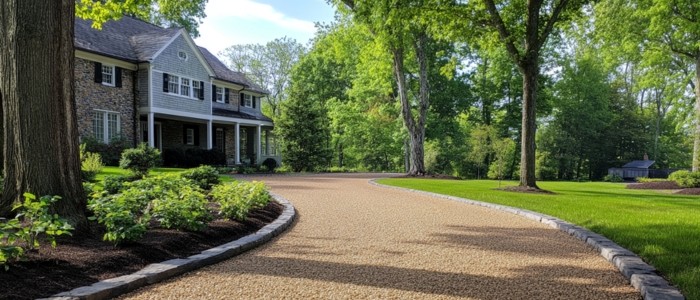
Environmental Impact – A Greener Driveway Choice
For homeowners seeking an eco-friendly alternative to traditional pavement, chip seal is a smart, sustainable choice.
Why It’s Environmentally Friendly:
- Recycled content: Both the liquid asphalt binder and the aggregate can include recycled materials, reducing raw material use.
- Low energy consumption: Chip seal uses less heat and fewer emissions than hot mix asphalt or concrete production.
- Reduced runoff: The stone-textured surface can help with natural water shedding and drainage, limiting erosion and pooling.
Compared to concrete or asphalt, chip seal has a lower environmental footprint in terms of material processing, installation, and maintenance.
By choosing chip seal, you’re not only protecting your driveway, you’re supporting a more sustainable future for your community.
Built for New England Weather
Chip seal driveways perform exceptionally well in Connecticut’s freeze-thaw climate. The flexible surface helps prevent cracking, while the textured stone improves grip during snowy or icy conditions.
Snow-ready: The rough finish offers natural traction and resists salt damage.
Drainage-friendly: Proper grading prevents pooling and ice buildup.
For homeowners dealing with long winters and seasonal storms, chip seal is a proven, weather-tough surface.
Installation Tips & Common Mistakes
To get the most from your chip seal investment, professional installation is essential. Avoid these frequent mistakes:
- Applying during wet or cold conditions
- Skipping base prep or compaction
- Using poorly graded or dusty stone
- Failing to compact aggregate evenly
Trusting experienced contractors like New England Asphalt ensures your surface performs and lasts as expected.
Extended FAQs
With proper base preparation and resurfacing, chip seal driveways in CT can last 15–20 years.
Yes, it’s ideal for resurfacing worn asphalt or stabilizing gravel bases.
No, the rough, aggregate surface provides better traction than smooth asphalt or concrete.
Most installations range from $5 to $10 per sq ft, depending on prep work and materials.
Yes, it uses recycled materials and consumes less energy than hot-mix asphalt or concrete.
Every 7–10 years is typical, depending on traffic and climate.
Yes, you can select from various natural stone colors and sizes for a custom look.
Thinking About a New Chip Seal Driveway?
Request a Free Quote
Our team is ready to help you create a durable, beautiful surface that stands the test of time. Contact us today to learn more.
Final Thoughts: The Advantages of Chip Seal Driveways
The advantages of chip seal driveways make them a popular choice for homeowners looking to enhance both the functionality and appearance of their driveway.
From durability and improved traction to quick installation and eco-friendly materials, chip seal provides a cost-effective and aesthetically pleasing solution for any home.
If you’re ready to upgrade your driveway, consider the advantages of chip seal.
With its ability to withstand the elements, improve safety, and enhance curb appeal, it’s a smart investment that can transform the look and function of your property.
Upgrade your driveway today!
Let us help you create a driveway that will stand the test of time. By following this comprehensive guide to chip seal driveways, homeowners can make an informed decision about their next driveway project.
Contact us today for a quote or to learn more about how chip seal can benefit your home

